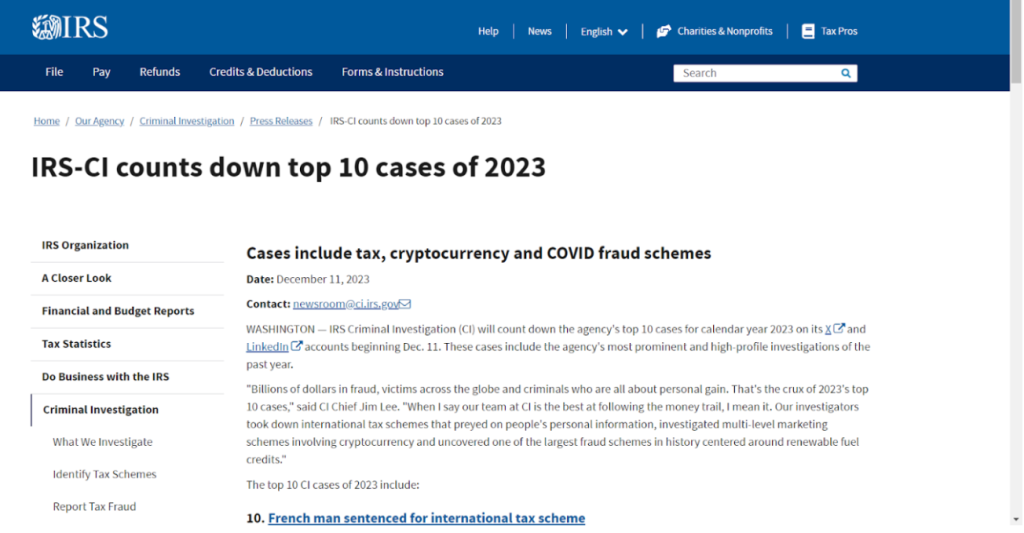Once hailed as the epitome of financial innovation, cryptocurrencies are finding themselves under the unrelenting gaze of legal scrutiny. The Internal Revenue Service (IRS) in the United States recently pulled back the curtain on its top cases of 2023, and a striking revelation emerged: four out of the ten involved cryptocurrencies.

Access the whole document here!
That raises pertinent questions about the legal complexities surrounding digital assets and their intersection with conventional legal frameworks. Let’s delve into the intricacies of each case.
Table of Contents,
- 1 Biofuel Laundering Fraud: A Billion-Dollar Scheme
- 2 Russian Gas CFO’s Tax Evasion: A $93 Million Conundrum
- 3 OneCoin’s Co-Founder: A 20-Year Sentence and $300 Million Penalty
- 4 BTC Laundering: Eight Years for $10 Million Scheme
- 5 Cable TV Restreaming Scheme: A $50 Million Fine and Incarceration
- 6 Lottery Tax Evasion Assistance: Four Years and a $6 Million Fine
- 7 SilkRoad’s Bitcoin Theft: One Year and Confiscation of 50,000 BTC
- 8 Oyster Pearl Tax Evasion: Four Years for Evading $5.5 Million in Taxes
- 9 Unemployment Benefit Scams: A 24-Year Prison Sentence for $5.5 Million
- 10 Tax Return Scams: A 34-Year Sentence for $2.2 Million Scheme
- 11 Conclusion: Navigating the Cryptocurrency Legal Landscape
Biofuel Laundering Fraud: A Billion-Dollar Scheme
Leading the list is a case of monumental fraud involving laundering $1 billion through biofuel channels. Five organizers, the architects of this financial conspiracy, were sentenced to 6 to 40 years behind bars. The magnitude of this case highlights the challenges authorities face in tackling sophisticated financial crimes utilizing cryptocurrencies.
Russian Gas CFO’s Tax Evasion: A $93 Million Conundrum
A CFO of a Russian gas company faced a seven-year prison term for evading taxes amounting to $93 million. This case underscores the global reach of cryptocurrency-related legal matters, showcasing the IRS’s commitment to pursuing offenders beyond U.S. borders.
Discover more! How Tether Blocks Wallets from OFAC Blacklist
OneCoin’s Co-Founder: A 20-Year Sentence and $300 Million Penalty
The infamous OneCoin crypto pyramid, a scheme that captivated headlines for its audacious fraud, led to a 20-year prison term for one of its co-founders. Additionally, a staggering $300 million penalty serves as a stark reminder of the financial repercussions awaiting those involved in cryptocurrency-related fraud.
BTC Laundering: Eight Years for $10 Million Scheme
A money laundering case involving $10 million in Bitcoin resulted in an eight-year prison sentence for the organizer. This case unveils the challenges law enforcement faces in tracking and prosecuting illicit activities conducted through the pseudonymous nature of cryptocurrencies.
Cable TV Restreaming Scheme: A $50 Million Fine and Incarceration
Innovative schemes transcend traditional financial arenas, as seen in a cable TV restreaming operation that incurred a $50 million fine and five years of imprisonment. This case demonstrates that legal actions extend beyond conventional financial fraud, encompassing evolving forms of economic crimes.
Lottery Tax Evasion Assistance: Four Years and a $6 Million Fine
Assisting in tax evasion related to lottery winnings led to a four-year prison term and a $6 million fine. This case explores the legal complexities arising from the intersection of cryptocurrency and traditional financial instruments.
SilkRoad’s Bitcoin Theft: One Year and Confiscation of 50,000 BTC
A noteworthy case involves the theft of 50,000 BTC from the darknet marketplace SilkRoad, resulting in a one-year prison term and the confiscation of all bitcoins. The legal implications surrounding cryptocurrency theft continue to evolve as law enforcement adapts to digital crime.
Oyster Pearl Tax Evasion: Four Years for Evading $5.5 Million in Taxes
Evading $5.5 million in taxes from Oyster Pearl cryptocurrency profits incurred a four-year prison sentence. This case delves into the intricacies of taxing digital asset gains, which remains a subject of ongoing legal and regulatory discussions.
Unemployment Benefit Scams: A 24-Year Prison Sentence for $5.5 Million
Scams involving unemployment benefits led to a severe penalty of 24 years in prison. This case highlights the diverse nature of fraudulent activities involving cryptocurrencies and their intersection with broader financial crimes.
Tax Return Scams: A 34-Year Sentence for $2.2 Million Scheme
The final case involves scams related to tax return fraud amounting to $2.2 million, resulting in a 34-year prison sentence. This case underscores the severity of consequences for those exploiting cryptocurrencies in conventional financial crimes.
As cryptocurrencies evolve, their entanglement with legal frameworks becomes increasingly complex. The IRS’s top cases in 2023 shine a spotlight on the diverse challenges presented by cryptocurrency-related offenses. From fraud to tax evasion, these cases underscore the necessity for a nuanced and adaptive legal approach to navigate the intricate terrain of digital finance. The intersection of cryptocurrencies and the law remains an ongoing narrative, with each legal case contributing to the evolving saga of digital financial accountability.



